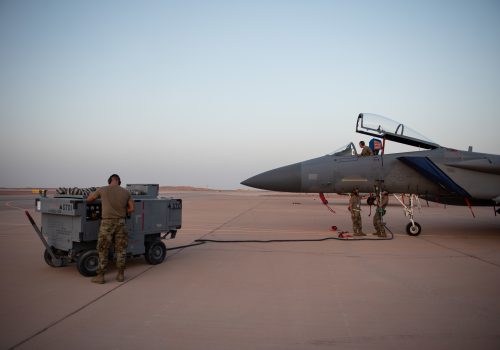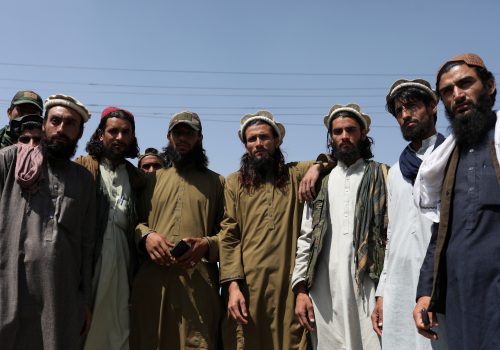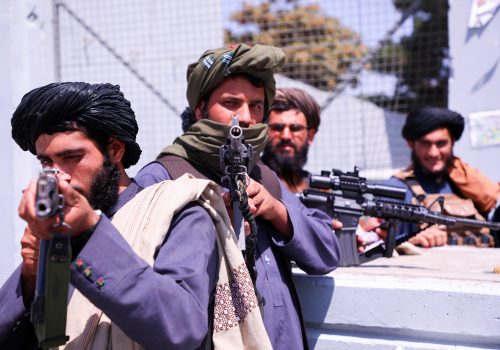What the Arab Gulf is thinking after the Afghanistan withdrawal
Following the US withdrawal from Afghanistan, three heavyweights in the Gulf are carefully navigating the aftermath—each calculating what it stands to gain (or lose) in its relationship with the United States.
How does this development alter their perceptions of security, and how will it impact their dynamics vis-à-vis Washington? Based on recent travel to the region and several conversations with officials, here’s what to expect:
Qatar: In the limelight, but walking on eggshells
Thanks to its invaluable assistance during the withdrawal—some 57,000 of the roughly 124,000 Afghans evacuated were processed through Doha—Qatar’s stock in Washington has risen.
American leadership recognizes that Qatar has the greatest institutional knowledge of any US partner about how Taliban leaders think. For ten years, Doha has mediated between Washington and the Taliban, and the group opened its office in Doha in 2013 with the approval and support of the United States—which decided it would be easier to monitor Taliban bigwigs there than to track them in various (and changing) locations around the world.
Among the countries that have functional relations with the Taliban—Qatar, Turkey, Russia, China, and Pakistan—the United States is closest to Qatar. It’s also the only one of these countries without either hostile intentions toward the United States or a list of concessions it hopes to obtain from it. That puts Qatar in a very strong position right now.
But Doha must be careful. Its role as the Taliban whisperer means it will be intrinsically tied to the group’s actions—and to the extent that the new rulers do or do not uphold their promises to the international community. Factions developing within the Taliban make this an increasingly tricky proposition.
So far, the Taliban has not upheld its promises, and if this trend continues, Doha’s reputation could take a serious hit. Qatari officials know how this can play out in Washington: They watched what happened to the United Arab Emirates following the murder of Saudi dissident journalist Jamal Khashoggi, after which Congress punished Abu Dhabi for its close relationship with Riyadh by placing every bit of UAE foreign policy under intense scrutiny.
The UAE has far more resilience in Washington than Qatar does, due to relationships formed by a long-serving ambassador, policies such as contributing combat troops to the Afghanistan fight and signing the Abraham Accords normalization with Israel, and lobbyists with a keen understanding of Capitol Hill. So the risk in Qatar’s case is greater. It may be the darling of Washington right now, but it’s in a tough position.
While it’s not pressing for recognition of a Taliban government at this point, Qatar is advocating for engagement with the group based on the premise of counterterrorism. Its foreign minister said three weeks ago that if the Taliban fails to stabilize the country, it could create opportunities for other terrorist groups to seize power.
The foreign minister knows his audience. The United States says its top priority in Afghanistan is preventing the country from becoming a safe haven for terrorists plotting attacks against the homeland and its partners around the world. For Qatar, couching coordination with the Taliban in counterterrorism terms is a smart tack in Washington.
Saudi Arabia: Slowly stepping away from the US
A planned meeting between Saudi Crown Prince Mohammed bin Salman and US Secretary of Defense Lloyd Austin was canceled two weeks ago, and word on the street is that it may be rescheduled for next month. Meanwhile, Saudi Deputy Defense Minister Prince Khalid bin Salman met with Austin’s Russian counterpart—a signal to the United States from both Saudi Arabia and Russia.
Riyadh wants Washington to know that it’s not choosing sides in tense US-Russia relations because there are things it needs that the United States cannot (or will not) provide. In this case, that’s intelligence on the ground about Taliban plans, as well as the movements of other extremist groups, which Russia provides through its own continued presence in Afghanistan.
This move isn’t out of the blue. Saudi Arabia has been pulling back from its singular reliance on the United States for the past few years. There are Chinese advisors embedded in its Ministry of Defense, while the kingdom took steps to develop a civilian nuclear program with Chinese assistance behind the United States’ back. Recently, Saudi officials participated in talks with Iran about détente—another indication that they’re no longer leaving their security entirely in the hands of the United States.
The current US administration asks Riyadh for small favors. But these favors are often unpopular with the Saudi population, which recently began paying a consumption tax and is therefore watching more closely how state funds are spent. Another recent favor that may not go over well is accepting Afghan evacuees (though Saudis note that the US government did not thank them for it the same way it’s thanked other countries). Saudi authorities worry about domestic opposition to taking in uneducated refugees who speak neither Arabic nor English and lack technical or other skills needed in their economy.
Riyadh was confused by the US request for it to accept Afghans for processing before taking them to the United States, and officials have wondered why they were expected to allow in Afghans who were not sufficiently security-vetted if the United States would not. While the Saudi government acknowledges that Washington keeps it in the loop on issues such as negotiations over the Iran nuclear deal, it laments the fact that it hasn’t heard a vision for the Middle East and South Asia from the Biden administration. The nature of the withdrawal from Afghanistan has Riyadh wondering whether Washington is flying by the seat of its pants all across the region (such as in Syria, Lebanon, Iraq, and Libya).
The State Department notified Congress last week of a possible five-hundred-million-dollar sale to the Royal Saudi Land Forces Aviation Command. Moving this sale forward would amount to the administration recognizing the need to show proof of partnership at a time when the value of that partnership is in question.
The kingdom would like the United States to continue sharing intelligence on terrorist groups such as the Haqqani Network, ISIS-K (the Afghanistan-based offshoot of the Islamic State), and al-Qaeda. But if US intelligence collection capabilities are degraded by no longer being on the ground, Saudi Arabia will likely keep Pakistan close out of a perceived need for insider information on what is happening in a chaotic Afghanistan that shares a border with Iran. The kingdom also wants to stay on the good side of Pakistan’s Inter-Services Intelligence (ISI), which will not only have influence with the Taliban, but will have a say in which non-state armed groups are inevitably permitted to set up shop in Afghanistan. Riyadh could theoretically use its financial support of Pakistan as a lever to press Islamabad to stop certain types of support for the Taliban that could benefit al-Qaeda. This week Riyadh offered to mediate the Kashmir political dispute between India and Pakistan. This move allows the kingdom to strengthen its defense relationship with India without alienating the ISI, a smart hedge.
Saudi Arabia does not want to see Afghanistan become an ungoverned space that creates a playing field for violent extremist organizations, but it likely won’t actively cooperate with the Taliban against ISIS-K for two reasons: 1. It’s wary of a Yemen-style scenario of protracted fighting; 2. ISIS-K can’t project as far as the Gulf yet. The Saudis have an active threat on their southern border, and they’ll be focused there.
If asked by the United States, Saudi Arabia will likely agree to again provide aid to Afghanistan through the King Salman Humanitarian Relief Center—but it will not agree to do so in the long term unless it’s shown a strategic plan for government formation and political rules of engagement with the Afghan government. Riyadh is not optimistic that this is forthcoming, based on case studies in Syria and Lebanon so far this year.
Along with Pakistan, both Saudi Arabia and the UAE recognized the Taliban government when it controlled Afghanistan from 1996 to 2001. But they don’t seem inclined to do so again, since they expect the Taliban to support a resurgence of al-Qaeda and the new government is close with Qatar.
The United Arab Emirates: Playing it safe
The UAE was surprised not by the US withdrawal from Afghanistan, but by how poorly it was done. According to Emiratis involved in airlift efforts, during the early days of evacuations, an Emirati pilot defied a “do not land” order from the air traffic control tower at Kabul airport; he landed anyway and successfully evacuated Emiratis and several hundred others. The sense in Abu Dhabi is that Crown Prince Mohammed bin Zayed (MBZ) is tired of cleaning up after the mistakes of others.
Since the fall of Kabul, the UAE has flown more than 250 tons of humanitarian aid into Afghanistan and has opened its airports to more than five thousand Afghan refugees. But early in the evacuation it was doubtful that it would accept any Afghan refugees at all, since MBZ is concerned that the Taliban will look for reasons to act against the UAE for having embedded its special forces troops with its American counterparts in Afghanistan. But this is where the Gulf rift has proven once again to have a silver lining for US foreign policy: A future in which Qatar is the unchallenged favorite Gulf partner of the Biden administration is untenable in Abu Dhabi, and for this and other reasons of national interest, the UAE has pulled out all the stops to assist with evacuation and humanitarian efforts.
The Emirati government is concerned about the growth and consolidation of other violent extremist groups inside Afghanistan. It fears that vocal opposition to religious extremism from its leadership will make the country a target for these groups. It will not rely on the United States for the most accurate information about these groups going forward. NGOs and officials in the UAE and Israel cooperated on an evacuation effort in their first combined aid mission since the signing of the Abraham Accords. This cooperation on the ground in Afghanistan will likely expand.
The UAE may also see a closer relationship with China as a way to keep eyes on the ground in Afghanistan. China shares with the UAE (and with Saudi Arabia, the United States, NATO, and Israel) the goal of preventing terrorist groups with ambitions of attacking abroad from setting up camp in Afghanistan. As China deepens its relationship with the Taliban-led government in Kabul—and leverages this relationship to maintain and expand the reach of its extraction ventures around the country—it will have better visibility inside Afghan borders than any Western nation.
From this, we can infer that the UAE will further ignore démarches from the United States about its relationship with China.
All three need more US guarantees
The United States may need Qatar, Saudi Arabia, the UAE, and other Gulf partners to conduct “over the horizon” counterterrorism operations in Afghanistan. While Central Asia is closer, all US operations from partner bases there would be subject to Russian approval—and any weapons platforms subject to Russian espionage.
Gulf partners feel they heard verbal reassurances from the Biden administration in past weeks that US operations will continue in Syria and Iraq, and that Washington remains committed to Gulf security. The Gulf, for its part, will need to weigh whether US actions backing these reassurances sufficiently counterbalance the risk of entering (or returning) into the crosshairs of potentially resurgent extremist groups operating from Afghanistan.
Gulf nations share US counterterrorism objectives in Afghanistan, but these countries will want to see support for their security if they are going to become a platform for the United States to ensure its own.
Kirsten Fontenrose is director of the Scowcroft Middle East Security Initiative in the Atlantic Council’s Middle East Programs.
Further reading
Image: Qatar's Emir Sheikh Tamim bin Hamad al-Thani attends the Gulf Cooperation Council's (GCC) 41st Summit in Al-Ula, Saudi Arabia, on January 5, 2021. Photo by Bandar Algaloud/Courtesy of Saudi Royal Court/Handout via REUTERS.


